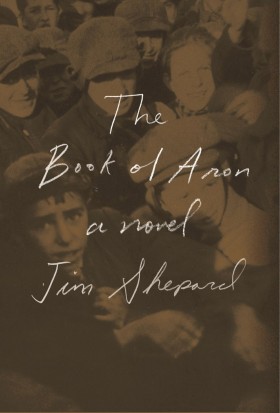Review: The Book of Aron
The Book of Aron by Jim Shepard is the haunting story of a Jewish boy and his family living in Poland at the beginning of World War II. It is not the story of a special boy, or of a particularly interesting boy, but that is perhaps why the book is so touching. We see everything […]
The Book of Aron by Jim Shepard is the haunting story of a Jewish boy and his family living in Poland at the beginning of World War II. It is not the story of a special boy, or of a particularly interesting boy, but that is perhaps why the book is so touching. We see everything from Aron’s straightforward perspective and his ordinariness only makes him more relatable to the reader and lends the story a sense of reality. We watch Aron’s life change as his family, along with so many others, is forced to move to the Warsaw Ghetto.
Although the book deals with graphic and mature themes, Aron’s perspective never feels annoyingly childish or overly mature. Everything is conveyed simply, with Aron sometimes not understanding quite what he is seeing, but the reader is given enough detail to understand the full scope of events. It is heartbreaking, but not melodramatic. It is realistic, but never dull.
Shepard takes a calm, unfeeling look at the happenings around this family and plainly relates to us what he sees – from the mundane familial issues, such as a mother’s disappointment in her son’s disobedience, to the quietly churning threat growing louder and louder until it engulfs everyone we meet.
That Shepard isn’t breaking new ground on a story of the Warsaw Ghetto doesn’t detract from the book and in fact only serves to make The Book of Aron more powerful. The reader knows what’s coming and Shepard is able to use that to create a tension that starts quietly but grows unyieldingly until the reader cringes with every turn of the page, knowing what can happen at any moment. Because there is nearly no mention of time except for occasional references to Jewish holidays or seasons, the reader is lost in the historical time frame and finds himself barreling towards the inevitable, like a prisoner in isolation awaiting his execution. The effect is terrifying and powerful, because although the reader knows what’s coming, he is caught by surprise, unprepared, along with the characters.
Shepard’s confidence in his historical knowledge comes through in his bold and vivid descriptions of everyday life in the ghetto. It is clear that he researched the subject meticulously and he relates the atrocious conditions with the impartiality of a textbook, which does nothing to lessen the reader’s disgust and horror. That he is able to have such an effect on readers who may already be familiar with the most infamous ghetto in the world is an impressive feat.
But the most impressive feat is his ability to create such a powerful and moving story and to give so much heart and humanity to such flawed characters, using only the unsophisticated eyes of a young boy. Readers who know what’s coming are not spared pain or heartbreak just because they’ve heard this before, because a single, simple glance from Aron’s perspective at a group of children gathered for uncertain departure will slay even the most prepared reader. Shepard’s power lies in the subtle and simple, making this story feel fresh, urgent, and powerful.
Read this if: you feel like being moved (then sitting somewhere quietly trying to come to terms with humanity).
Give this to: anyone interested in historical fiction, anyone interested in stories of children during wartime, anyone with a heart – anyone, really.
Tatiana Sundeyeva-Orozco has gotten into the terrible habit of thinking too much about everything. She enjoys fantasizing about traveling, compulsively buying literature, laughing at her own puns, and consuming anything (and everything) that can be found in a bakery. She is a graduate of UC Berkeley where she got a degree in English with a minor in Italian. She can be found celebrating awesome female friendships on LadyBromance.com.
By Tatiana Sundeyeva-Orozco






